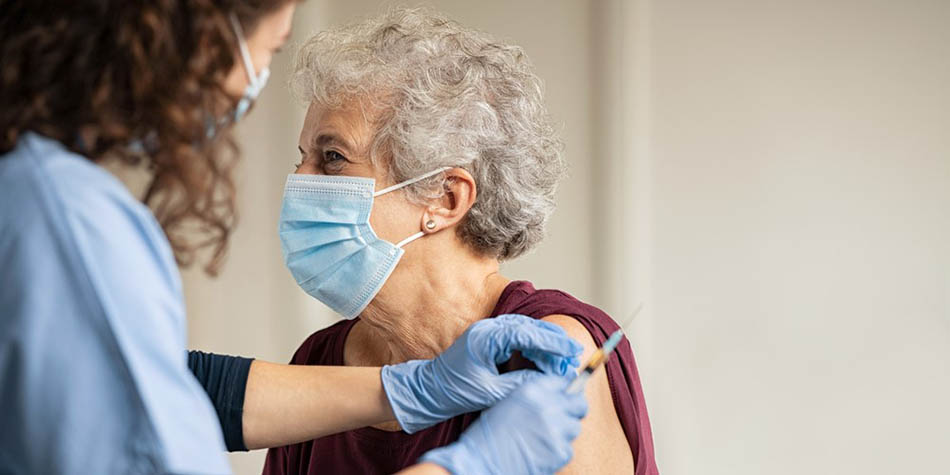
You can prevent shingles by staying up to date on vaccinations.
One in 3 people in the U.S. will develop shingles in their lifetime. But what is shingles, who's at risk of contracting it and is it preventable?
Here's what you need to know about this rash and how you can relieve your symptoms if you get it.
What is shingles?
Shingles is a painful, blistering rash. While some cases are mild, most people with shingles experience intense pain that can last for two to four weeks. In some cases, shingles leads to complications that can continue for months or even years.
What are the signs and symptoms of shingles?
The first signs of shingles include pain, itching or tingling on one side of the body, usually the chest, stomach or back. You might experience shooting pain or burning, or the area may feel numb or tingly. Sometimes people feel tired and achy and develop fever, chills, headache or an upset stomach that can feel like the flu. After a few days, a blistering rash appears on the skin, causing intense pain.
The rash usually appears around the waistline but occasionally on other parts of the body, including the arms, head or face. You can even get shingles inside your body without a visible rash. If the rash appears on the face, it can damage the eyes. In rare cases, shingles can lead to blindness, hearing problems, pneumonia and inflammation in the brain. Some people who get shingles develop long-term nerve pain called postherpetic neuralgia, which limits daily activity for years. Some people even die from shingles complications. But for most people, blisters from shingles usually scab over in a week or so, and they recover fully in two to four weeks.
Who can contract shingles?
The varicella virus causes both chickenpox and shingles. Even after you recover from chickenpox, the virus stays in the nerves in your body. Most of the time, the virus remains dormant — meaning it's there, but it doesn't cause trouble. However, the virus can get reactivated and cause symptoms much worse than the first time.
If you've had chickenpox, you can get shingles. Nearly all people born before 1980 have had chickenpox, even if they don't remember getting sick. If you've been vaccinated against chickenpox, you can still develop shingles, but your risk is much lower than if you've had chickenpox.
As you get older, your risk of shingles increases, but younger people can also get this uncomfortable condition. If you have a weakened immune system from cancer, cancer treatment, immune-suppressing medications or HIV infection, you're at a higher risk for shingles and its complications. Stress, too much sun and steroid medications can also cause the varicella virus to wake up and cause shingles.
You can't get shingles from someone who has the rash. However, if you've never had chickenpox or if you haven't had the chickenpox vaccine, you can get chickenpox from someone who has shingles. Pregnant women, infants and people with weakened immune systems should avoid contact with anyone who has an active shingles rash, especially if they haven't had chickenpox or been vaccinated against chickenpox.
To prevent spreading the varicella virus, people with shingles should:
- Keep the rash covered
- Avoid touching the rash
- Wash their hands often
What treatments are available for shingles?
To help ensure a fast and full recovery, see your doctor if you think you might have shingles, ideally within three days of developing the rash. Taking antiviral medications (such as acyclovir or valacyclovir) can help improve your symptoms faster. Medications to reduce pain — such as acetaminophen or ibuprofen — can make you more comfortable while you're recovering.
These self-care steps can also help relieve pain and discomfort stemming from shingles:
- Wear loose clothing
- Apply a cool, wet washcloth to the rash
- Take a bath with colloidal oatmeal or soothe skin with calamine lotion
- Avoid stress
- Get plenty of rest
- Eat nutritious foods
- Distract yourself with television, music or a relaxing hobby
- Take a walk, stretch, do yoga or engage in other gentle exercises
How can you prevent shingles?
The best way to prevent shingles is to get the shingles vaccine as soon as you're eligible. The vaccine consists of two doses separated by two to six months. It's recommended for everyone over age 50 and for anyone 19 or older who has a weakened immune system. The currently available shingles vaccine — Shingrix — is 97% effective in adults ages 50 to 69 and 91% effective in adults over age 70. Even in people with weakened immune systems, effectiveness is usually more than 70%. Protection remains high for seven years.
Even if you've had shingles in the past, you can still get the vaccine. If you received the chickenpox vaccine, you may have a lower risk of getting shingles, but you're still at risk and should get the Shingrix vaccine when eligible. Your doctor can advise you on when you should receive the vaccine based on your health and other risk factors.
While getting the vaccine reduces your risk of shingles, it's not 100% effective. So, be on the lookout for the symptoms, especially if you're part of an at-risk group. If you get shingles, follow your doctor's guidance to minimize complications and aid in your recovery.
$webqFacilityNumber
Need a Physician?